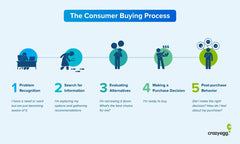
Mastering Brand Marketing: Building Trust and Loyalty for Lasting Business Success
Table of Contents
- Key Highlights:
- Introduction
- Understanding Brand Marketing
- Brand Marketing vs. Branding: Key Differences
- The Importance of Brand Marketing for Business Growth
- Building a Successful Brand Marketing Strategy
- The Role of Social Media in Brand Marketing
- Measuring the Success of Brand Marketing
- FAQ
Key Highlights:
- Brand marketing focuses on promoting a brand's identity and values, fostering long-term trust and customer loyalty beyond mere product sales.
- Distinct from branding, brand marketing is the external communication that engages customers emotionally and drives brand recognition and engagement.
- Effective brand marketing strategies leverage storytelling, consistent messaging, and digital tools to enhance brand awareness and customer lifetime value.
Introduction
In a marketplace saturated with options, where countless products vie for consumer attention, branding transcends mere aesthetics. Companies like Nike, Apple, and Glossier exemplify the power of brand marketing, not just through their innovative products but via the compelling stories they tell and the emotional connections they forge with their audiences. Such narratives cultivate a loyal customer base that resonates with a brand's mission and values. In this context, brand marketing emerges as a crucial strategy for any business aiming to thrive. This article delves into the essence of brand marketing, distinguishes it from traditional branding, and outlines actionable strategies to enhance your brand's presence and impact.
Understanding Brand Marketing
Brand marketing is the deliberate effort to cultivate a brand's identity and communicate that identity to its target audience. It encompasses the mission, values, and personality of a brand, aiming to build awareness, trust, and loyalty among consumers. Unlike performance marketing—which prioritizes immediate sales and measurable conversions—brand marketing focuses on fostering an emotional connection with the audience. This long-term approach is essential for sustainable business growth.
The Emotional Connection
The ability to evoke emotions through brand marketing creates deeper consumer relationships. Successful brands understand that purchasing decisions are often driven by feelings rather than merely functional attributes. For instance, Nike's campaigns frequently highlight themes of perseverance and empowerment, encouraging individuals to push their boundaries. This emotional resonance not only drives sales but also engenders a loyal community of brand advocates.
Brand Marketing vs. Branding: Key Differences
Branding and brand marketing, while interconnected, serve distinct functions within a business strategy.
What is Branding?
Branding is the foundational work that defines how a brand is perceived. It includes developing a logo, selecting a color palette, and establishing the brand's voice. Branding lays the groundwork for brand identity and encompasses:
- Corporate Branding: Shapes the overall image of the company.
- Product Branding: Focuses on individual products.
- Service Branding: Tailors branding efforts for service-oriented businesses.
- Personal Branding: Builds the reputation of individuals within an organization or industry.
The objective of branding is to create a cohesive identity that resonates with consumers and remains consistent across all platforms and communications.
What is Brand Marketing?
On the other hand, brand marketing actively promotes that identity to the target audience. It involves:
- Crafting compelling narratives that highlight the brand's values.
- Utilizing digital platforms for outreach and engagement.
- Engaging with consumers through storytelling and emotional marketing tactics.
In essence, branding establishes who you are, while brand marketing communicates why consumers should care.
The Importance of Brand Marketing for Business Growth
Brand marketing is not just an accessory to business strategy; it is a critical driver of growth and sustainability.
Recognition and Awareness
A fundamental goal of brand marketing is to enhance recognition and awareness within a crowded marketplace. If consumers are unaware of your existence, they cannot engage with your offerings. Effective brand marketing ensures that your business stands out, making it easier for potential customers to discover and remember you.
For example, Coca-Cola's successful brand marketing strategy revolves around its iconic red branding and timeless messaging. The company's consistent visual identity has made it one of the most recognized brands globally, demonstrating how effective brand marketing can build familiarity and customer loyalty.
Trust and Credibility
Trust is paramount in converting potential customers into loyal advocates. A consistent brand identity—reflected through visuals, voice, and messaging—creates a unified image that builds credibility. This trust leads to repeat business and long-term relationships with customers, who are more likely to choose your brand over competitors when they feel a connection.
Differentiation in Competitive Markets
A strong brand marketing strategy helps differentiate a business from its competitors, particularly in saturated markets. By emphasizing unique brand values and stories, companies can carve out a niche that attracts a specific audience. This differentiation is crucial for standing out and establishing a loyal customer base.
Building a Successful Brand Marketing Strategy
Creating a brand marketing strategy involves several key steps, each designed to enhance how consumers perceive and connect with your brand.
Define Your Brand Identity
Begin by clearly defining your brand's mission, values, and positioning. What does your brand stand for? Who are your target customers? Understanding these elements will guide your messaging and marketing efforts.
Craft Your Brand Story
A compelling brand story engages customers on an emotional level. Share the origins of your brand, the challenges you've faced, and the impact you aim to make. This narrative should reflect your brand's mission and values, creating a deeper connection with your audience.
Consistency is Key
Consistency across all touchpoints is vital for reinforcing brand identity. Ensure that your branding elements—logos, fonts, colors, and tone—are uniform across your website, social media, and marketing materials. This consistency helps build recognition and trust.
Leverage Digital Tools
Utilizing digital tools can enhance brand marketing efforts. Analytics platforms like Google Analytics and social media management tools such as Sprout Social can provide insights into consumer engagement, allowing you to refine your strategies effectively.
Invest in Storytelling and Content Marketing
Crafting engaging content that tells your brand story can significantly enhance brand awareness. Utilize various formats—blogs, videos, social media posts—to share your narrative. Storytelling not only captivates your audience but also fosters a community around your brand.
Engage with Your Audience
Direct engagement with your audience through social media, email newsletters, and community events fosters a sense of belonging. Encourage customer feedback and interaction, showing that you value their opinions and contributions. This approach builds trust and loyalty.
The Role of Social Media in Brand Marketing
Social media platforms are powerful tools for brand marketing, providing businesses with the ability to reach and engage their target audience on a large scale.
Building Community
Social media allows brands to create a community around their identity. By sharing content that resonates with your audience and encouraging interaction, you can foster a loyal following. Brands like Glossier leverage social media to engage directly with their customers, creating a sense of community and ownership among their audience.
Content Sharing
Sharing user-generated content is an effective way to showcase your brand's personality and values. Encourage customers to share their experiences with your products and feature their content on your brand's social media pages. This not only builds trust but also amplifies your reach.
Targeted Advertising
With the ability to target specific demographics, social media advertising can be a highly effective component of brand marketing. By crafting ads that align with your brand message and values, you can reach potential customers who are more likely to resonate with your story.
Measuring the Success of Brand Marketing
Assessing the effectiveness of your brand marketing efforts is crucial for continuous improvement.
Key Performance Indicators (KPIs)
Establishing KPIs allows you to measure the success of your brand marketing initiatives. Common metrics include brand awareness, customer engagement, and sentiment analysis. Tracking these metrics can provide insights into how well your brand is resonating with your audience.
Customer Feedback
Direct feedback from customers can offer invaluable insights into their perceptions of your brand. Conduct surveys, monitor social media discussions, and engage with customers to understand how they view your brand and what improvements can be made.
Analytics Tools
Using analytics tools can help track engagement metrics and assess the effectiveness of your marketing campaigns. Platforms like Google Analytics can provide data on website traffic, user behavior, and conversion rates, guiding your strategy moving forward.
FAQ
What is the difference between brand marketing and performance marketing?
Brand marketing focuses on building long-term relationships and emotional connections with consumers, while performance marketing prioritizes short-term sales and measurable outcomes.
How can I measure the effectiveness of my brand marketing?
You can measure effectiveness through key performance indicators (KPIs) such as brand awareness, customer engagement, and feedback, as well as using analytics tools to track user behavior.
Why is storytelling important in brand marketing?
Storytelling is essential because it creates an emotional connection with consumers, making your brand more relatable and memorable.
How does social media contribute to brand marketing?
Social media provides a platform for direct engagement with customers, facilitates community building, and allows for targeted advertising to reach specific demographics effectively.
What are some common strategies for building brand awareness?
Common strategies include consistent branding, leveraging social media, engaging with customers through content marketing, and utilizing digital tools for analytics and insights.
By embracing these principles of brand marketing, businesses can cultivate a lasting brand that resonates with customers, fosters loyalty, and drives growth in an increasingly competitive landscape.
Alimentez votre commerce électronique avec nos aperçus et mises à jour hebdomadaires !
Restez aligné sur ce qui se passe dans le monde du commerce
Adresse e-mail
Sélectionné pour vous
23 July 2025 / Blog
Hasbro's Resilience Amid Tariffs: How Magic: The Gathering and Strategic Moves Drive Growth
Lire la suite
23 July 2025 / Blog
The Power of Personalization in E-commerce: Strategies for Success
Lire la suite
23 July 2025 / Blog


